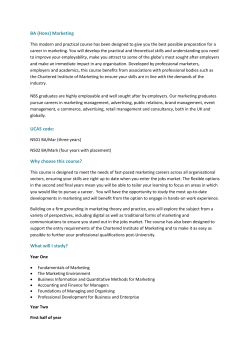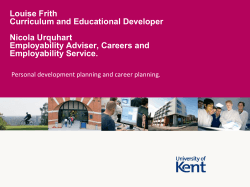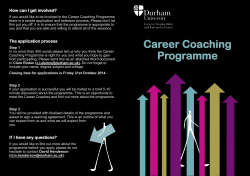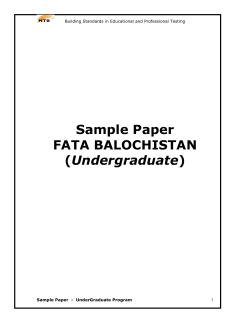
The College of Social Sciences Graduate Skills Programme (GSP)
The College of Social Sciences Graduate Skills Programme (GSP) Dr Dickon Copsey: College of Social Sciences Employability Officer and GSP Coordinator Karen Sawyer: Final year politics undergraduate and GSP Tutor Katharina Koenig: Final year economics with business economics undergraduate and GSP Tutor 1. What is GSP? 2. Development and strategic drivers 3. Engagement and evaluation 4. Future developments 5. Tutor views 6. Question and answer http://www.glasgow.ac.uk/gsp GSP workshop: Schedule 1. What is the Graduate Skills Programme? • Employability programme launched October 2010 • Undergraduate and postgraduate taught • Transferable skills developed through academic studies, extracurricular, and workrelated activities • Voluntary, certificated GSP Elements and activities • 4 GSP Elements • ‘Sessions’, ‘selfdirected activities’ and ‘workshops’ • GSP staff, Careers Service, Student Learning Service, SRC, Student Volunteer Service, Student Enterprise, graduate employers Reflection table: Example Key incident table: Example Summary paragraph: Example Personal Development Plan: Example Mahara ePortfolios 2. Development and strategic drivers • Development – Undergraduate and postgraduate; Academic colleagues; Careers Service, SLS, SRC; Graduate employers • Student context – Lack of engagement with PDP (Cashman 2007) – Active students unaware of value of activity – Strategic reason for engaging with PDP – Lack of awareness of: – Employer skills (eg. CBI) and how to evidence – Range of services/activities across university (eg. Universum survey) – Transferability of academic skills to workplace Policy background – PDP Policy & Action Plan (2007-08) “PDP will provide a framework to help students: make sense of the experiences available to them at Glasgow University and how they relate to personal, educational or career-related goals; Learn more about the variety of development opportunities on offer; Summarise their student experience, reflect on, record and recognise ‘critical’ events and gather evidence of achievements and skills that are essential for academic performance, CV and career development” – L&T Strategy and College (Faculty) LTP – QAA Enhancement theme: Graduates for the 21st Century – HEA ‘PDP and Employability’ in Learning and Employability series – Researcher development framework – GAWG and GA Research Project Methodology • ‘Linked’ model (Atlay, 2009) • Learning process: – – – – Experience activities and sessions Reflect on (and describe/record ) what done Theorise skills that can be extrapolated from activities Plan for future personal and professional development through plans and templates • Academic, personal and employability strands • Peer support (tutors as ‘role models’; group work and sharing experiences) 3. Engagement and evaluation GSP Participants Postgraduate taught 307 Undergraduate 163 GSP Participation Induction/ePort. SLS ExtraWork-related Jobs and workshops Sessions curricular learning careers 179 277 182 199 370 GSP ePortfolios = 40 46 GSP respondents (45% UG and 55% PGT) Evaluation: GSP workshops Evaluation: GSP workshops GSP End of year evaluation GSP End of year evaluation • GSP helps: – to develop students' confidence in the academic and transferable skills which will help them in their academic studies and their future careers (94%) – students to talk and write formally about their academic and transferable skills (100%) – students to market themselves to potential employers (88%) GSP End of year evaluation Most useful aspect of GSP – I found reflecting back on activities and techniques I used in the past the most beneficial part of the ePortfolio this year as I was concentrating on my Academic Skills. Next year I hope to expand on all aspects of GSP when completing other sections. – Being able to talk one-on-one with the organisers of the programme and go through the ePortfolios on an individual basis. – The Mahara ePortfolios were the most useful as they allow you to record the key transferable skills which you have learned and this can be presented to potential employers, which is very useful in distinguishing yourself from other candidates. – Forced me to reflect on my skills. It is an important service to a lot of students if they want to prepare for future employment because they won't be prompted to market themselves anywhere else until it could be too late. I now feel like I am on track to gain a variety of skills from my university years. – Encouraging me to document all the skills I have developed and the activities I have participated in Least useful aspect of GSP – I feel that I need to consolidate my use of Mahara, but this is probably a personal goal / mahara was a little confusing and it was sometimes difficult to insert information – No / I didn't really find anything not useful as it was how I used each aspect togather which worked and I gained important knowledge and understanding of my future employability. – I thought it was really good on the whole. I think the 'points' system could be explained in a clearer way in the books. When explained by the organisers in person, it was much clearer. – The sessions were sometimes a little dry, and would help if there was some group exercises/other form of student participation. – Perhaps there would be more of an incentive to attend the help/enquiry sessions if they were placed at a later time in the day or twice in one week. How could we improve GSP? • I think more examples would be useful, however obviously these examples are something which will come with time. • better advertisement, I found out about the service by accident. / the way to let students join / Encourage more people to take part! • It is often difficult to attend all of the workshops therefore if there were more options in terms of attending these it would improve the number of sessions I could have attended / probably by scheduling meets at times not conflicting with lectures. • The model of it is sound. Support is offered but students do the bulk of the work. Again I wouldn't say I experienced enough of it to recommend any improvements. • more detailed session on negotiating and using Mahara / Perhaps make entering the data into Mahara require a little less computer-savvy. Pre-prepared portfolios could be available to save all the time it took to format and suchlike. • i think it will be better, if we can get more chances to communicate with hr managers. • Perhaps more group discussions where members can share stories and experiences; they could receive feedback on their relevance to the work world and get them to start reflecting early on. 4. Future Developments: 2011/12 • Re-mapping GSP skills framework against Graduate Attributes matrix • Replace ‘example’ ePortfolios with ‘templates’ • Course approval to ensure transcript recognition and Adviser of Studies buy-in • Additional workshop on reflective writing (eg. Add reflective writing example/blog to ePortfolios?) • More reflection on discipline specific skills within Academic skills ePortfolio • Increased peer feedback on ePortfolios • Refine evaluation process • Review marketing of GSP to prospective students 5. Tutor views More information GSP overview: http://www.glasgow.ac.uk/gsp GSP ePortfolio examples and templates http://portfolio.gla.ac.uk/view/view.php?id=833 Mahara guides: http://cterport.ed.uiuc.edu/technologies_folder/mahara-tutorials http://eportfoliosineducation.info/#/mahara-help/4532527452 GSP Coordinator: Dr Dickon Copsey College Employability Officer tel + 44 (0) 141 330 4570 Email: Dickon.Copsey@glasgow.ac.uk http://www.gla.ac.uk/colleges/socialsciences/info/students/employability/ Extra slides • Focus on generic competencies rather than subject specific skills can “help resist creeping vocationalism with regard course content and legitimise the continuing value of traditional academic disciplines”. • “as these generic competencies can also be developed through extra-curricular activities, it can reaffirm the value of the wider-student experience” (HEA, PDP and Employability, p. 12, 2009) Extra slides: What is a Professional Development Portfolio? • Provide a body of evidence which demonstrates your career development and professionalism – Demonstrate your own insight into your professional growth by reflecting on the themes, trends and patterns that cut across your undergraduate and postgraduate studies/research projects/work experience/employment history • Enable you to practice reflective learning and thinking • Reflect on your achievements, qualifications and other external assessments • Employ self assessment as a tool to develop goals for the future • Match skills, qualifications, interests and competencies with potential career paths – Demonstrate a commitment to planned career development and awareness of the importance of lifelong learning to develop professional competency
© Copyright 2025













